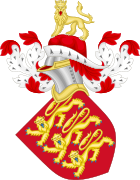Statute of Westminster 1285 facts for kids

|
|
| Long title | Statutes of King Edward, Made at WESTMINSTER in his PARLIAMENT, at EASTER, In the THIRTEENTH YEAR of his Reign |
|---|---|
| Citation | 13 Edw. 1. St. 1 |
| Territorial extent | England and Wales |
| Dates | |
| Commencement | 1 April 1285 |
The Statute of Westminster of 1285 was an important set of laws made in England a very long time ago. It is also known as the Statute of Westminster II or the Statute of Westminster the Second. Think of it like a big rulebook for the country. This law included a famous rule called De donis conditionalibus, which was a super important part of how land was owned and passed down in England during the Middle Ages.
Most of this old law was cancelled, or repealed, in the Republic of Ireland in 1983. The rest of it was repealed there in 2009.
Contents
What Was This Old Law About?
The Statute of Westminster of 1285 was a major collection of rules for England. It was created by the Parliament of England during the time of King Edward I. This law helped to organize many parts of life in England. It covered things like how courts worked and how people could own land.
Why Was It So Important?
This statute was very important because it brought many different laws together. It helped to make the legal system clearer and more organized. It also introduced new ideas about how land could be owned. This helped shape the future of land ownership in England for hundreds of years.
Key Parts of the Statute
The Statute of Westminster II had 50 different sections, called chapters. Each chapter dealt with a different rule or part of the law.
The De Donis Conditionalibus Rule
The very first chapter of this statute was called De donis conditionalibus. This Latin phrase means "concerning conditional gifts." It was a huge deal for land ownership. Before this rule, if someone gave land to their child, that child could sell it. But this new rule made it harder to sell land that was given as a gift. It helped keep land in families for many generations. This specific rule is actually still in force in some ways today, which shows how lasting it was!
The Commons Act 1285
Another important part was Chapter 46. This chapter later became known as the Commons Act 1285. It dealt with rules about common land, which was land that many people could use together. This part of the law was cancelled in England in 2006 and in Wales in 2007.
See also
- Casu consimili
- Statute of Winchester of 1285 (13 Edw. I, St. 2)
 | Selma Burke |
 | Pauline Powell Burns |
 | Frederick J. Brown |
 | Robert Blackburn |

